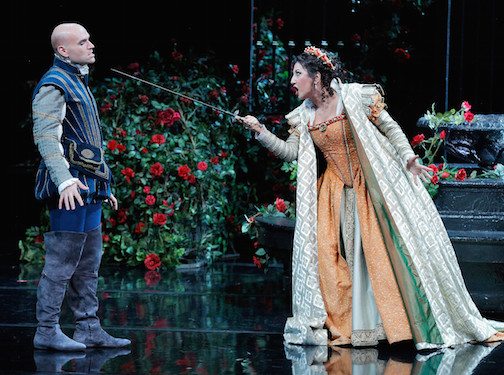
The grandly operatic Don Carlo
Weighing in at five acts, four hours 28 minutes and 132 performers, San Francisco Opera’s production of Verdi’s Don Carlo is an operatic heavyweight. The opera premiered in French in Paris in 1867 and went through several revisions until it reached the Moderna version in 1886, the version currently being performed at the War Memorial Opera House.
Based on a play by the 18th-century German poet and philosopher Friedrich Schiller, Don Carlo bears little resemblance to historical fact. As Kip Cranna, SF Opera’s dramaturg, points out in the program, Don Carlos was heir to the Spanish throne, descendant of the famous Ferdinand and Isabella, who financed Columbus in an attempt to broaden and enrich their Empire. Don Carlos, as he writes, was not only sickly but given to displays of extreme violence. In short, an inbred royal with psychopathic tendencies.
Not so Verdi’s glamorous Don Carlo. A passionate and faithful admirer of the French bride Don Carlo’s father, Philip II, snatched from his son’s amorous daydreams in order to cement a truce between Spain and France, the operatic Carlo is heroic, gallant, loyal and sighing unto death for his would-be ladylove, the fair and noble Elisabetta of Valois. At least two out of the opera’s four-plus hours is devoted to this unrequited romance. One hour or so is dedicated to Carlo’s mutually loyal friendship with Rodrigo, Marquis of Posa, and their dedication to “la libertà”. And about one and a half hours are dedicated to the threatening catastrophes of religion, in the form of the Grand Inquisitor and the plight of the Protestant Flemish, who are being mercilessly destroyed by the Catholic Spanish.
Despite the fact that Verdi is using the characters for his own romantic purposes (and what artist doesn’t?), the opera and this production move with a magisterial pace, depending rightly on the music and its vocally splendid cast to stand and deliver.
The pure-toned soprano Ana Maria Martinez sings the role of Elisabetta, and does so with elegance. Her long fifth-act aria “Tu che le vanità” is the final exquisite summation of her interpretation. She is balanced by mezzo Nadia Krasteva singing the bad-girl role of Princess Eboli. Krasteva’s moment comes in “Nel giardin del bello”, a song about a Moorish prince filled with exotic ornamentation.
The real punch of the opera, though, comes with the male roles. Tenor Michael Fabbiano sings Don Carlo with fervent brilliance and a particularly round tone that seems characteristic of American training. He especially cuts loose in his duets with baritone Mariusz Kwiecen, in which the two belt it out at the top of their considerable lung capacities. The added plus is that they both look great in tights and thigh-high boots, even with those short puffy pants that were all the rage in the 16th century.
Bass René Pape sings the austere and jealous King Philip. He and the Grand Inquisitor, sung by bass Andrea Silvestrelli, shed political and vocal darkness all over the stage, adding to the gravity of the drama.
The singing is so good that historical inaccuracy and general romantic absurdity are easily overlooked. The symphony, led by Maestro Nicola Luisotti, was its usual fabulous self. As was the chorus.
The third act auto-da-fé was dramatically recreated with yards and yards of red fabric falling the vertical distance of the stage, in front of which three sad souls in pointed caps ultimately were lofted into the heavens. Their demise witnessed by scores of chorus, dancers and supernumeraries. Production design was thoughtfully done by Zack Brown. Emilio Sagi was the director. Quite a pageant!
– Jaime Robles
Don Carlo continues through June 29 at the War Memorial Opera House. Information and tickets can be found at sfopera.com.
Photo: Michael Fabbiano as Don Carlo is confronted by Nadia Krasteva as Princess Eboli. Photo courtesy Cory Weaver/ San Francisco Opera.
